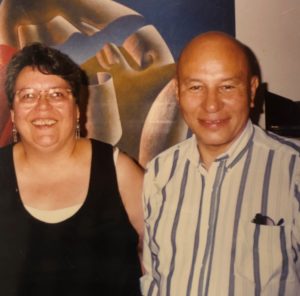#HumansOfCoopHousing: Co-op living provides aging in place for urban Indigenous couple, Hilton and Philomena
Published June 23, 2021

Hilton: Toronto’s a very large city, but living in the co-op, you get good information from the board. We formed a seniors’ group for sharing information and resources. Some seniors don’t have internet.
Philomena: Big cities are becoming more and more just for the wealthy. When you’re shut up, like we have been, you find out how intertwined we are. We’re happier when we’re giving, helping. We would definitely recommend co-op living.
Hilton: My father’s family was from the Six Nations Reserve. He was Mohawk, and my mother was Seneca. I grew up near Ingersol, Ontario.
Philomena: I’m Native, but I was raised by an Irish family in Toronto. I became a member of Concerned Native Citizens when I was younger and heard about the co-op from a credit union. Some people were forming a board for a new co-op.
Hilton: I wanted to go to the Ontario College of Art, and I was looking for a place to live. I had asked my daughter if I could stay with her, then I met Philomena.
These paintings and rooftop chairs are an example of Hilton’s artwork that adorns common spaces in the co-op.
Philomena: I knew Hilton would be a good fit for the co-op. He’s a very co-operative and sharing person. He became the principal planner for our Winter Celebration, and played Santa for several years.
Hilton: I was the on-call person for a long time. If anyone in the co-op had a problem, outside of office hours, a leaky pipe, or anything really, they’d call me first. I had to decide, well, is this really an emergency or can it wait? I could fix little things.
Philomena: We’re both mobility-challenged now, and as you age, as friends and family start dying, and children and grand-children live far away, the co-op becomes your community. It softens the isolation.
Hilton: Co-ops can be good housing for Indigenous people. What’s important is to teach people, educate people about how co-ops operate.
Our Humans of Co-op Housing series features individuals who are making their co-ops a better place or speaking up for the importance of co-op housing. Let us know at info@chfcanada.coop who you’d like to see featured next.
Don't miss out on the latest co-op news, success stories, and helpful resources for your co-op. Sign up here to receive our eNews every two weeks straight to your inbox!



